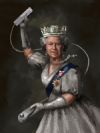|
ESL Forum:
Techniques and methods
in Language Teaching
Games, activities
and teaching ideas
Grammar and
Linguistics
Teaching material
Concerning
worksheets
Concerning
powerpoints
Concerning online
exercises
Make suggestions,
report errors
Ask for help
Message board
|
ESL forum >
Grammar and Linguistics > will be - was be ??
will be - was be ??
|

miharbi80

|
will be - was be ??
|
|
We can say " I will be a teacher" but why can �t we say I was be a teacher? what is the reason? |
15 Feb 2010
|
|
|
|

ELOJOLIE274

|
well,
"was" is the verb BE in the past!!! so you can say "I was a teacher" "I �m a teacher" or "I will be a teacher" but you �re refering to different times...
but there �s something I don �t understand: the verb BE is one of the 1st verbs you learn when you �re learning English, so how can you be a teacher if you don �t know that?? I don �t want to sound disrespectful or anything but i �m just wondering...
maybe there �s a problem in your question... were you wondering if you can say "I was being a teacher"??
bye
|
15 Feb 2010
|
|
|

zoemorosini

|
|
I share miharbi80 �s sense of wonder. I �m interested in the etymology of different English verbs and such; why do we conjugate "to be" when in past tense but not after modals? There must be a reason based in the history of the language. I don �t think miharbi80 doesn �t know to change the verb--just why does it change in this way?
I look forward to other members � knowledgeable comments regarding this! |
15 Feb 2010
|
|
|

Vernica

|
I think you are having a problem of ambiguity tolerance, this is when you try to translae into your own language (Portuguess) English language, which has got Its own rules. It �s true that you can say "Eu estaba a ser" but in English is unthinkable. Try reading a grammar again and you will realize the fact that you cannot use "I was be" ever, to express either future or past.
Please take into account that you are teaching English to fresh minds which are going to take for granted everything you say, so please sure when you teach!
|
15 Feb 2010
|
|
|

Vernica

|
|
On the other hand If you are wondering about Old English, try HEL (university of Manchester, professor Miyuri) a wonderful sitcom about English history. The history of passive voice can help you to understand the process of reanalys between to have and to be, therefore this kind of doubts about was be and will be, but take into account that was (weorden in Old English) already existed as a strong verb.
|
15 Feb 2010
|
|
|

yanogator

|
|
Modals are always followed by the base form of the verb, so "be" isn �t being treated in a special way here.
Bruce |
15 Feb 2010
|
|
|